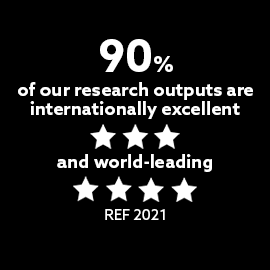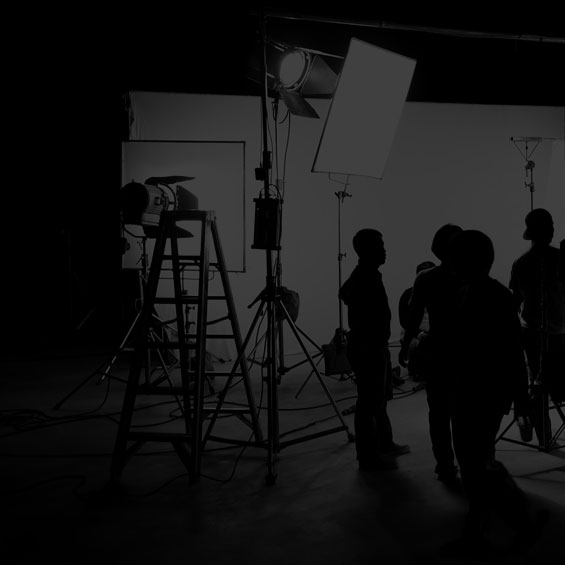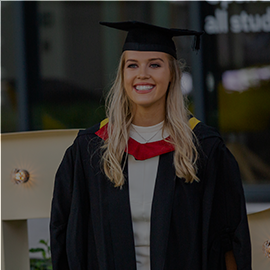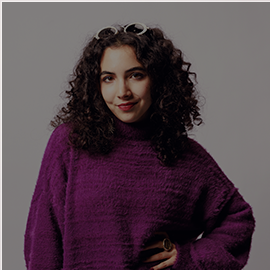Creative Writing MA
1 Year Full-Time | September Start
 Option for Placement Year
Option for Placement Year
 Option for Study Abroad
Option for Study Abroad

If you鈥檇 like to receive the latest updates from Northumbria about our courses, events, finance & funding then enter your details below.
* At Northumbria we are strongly committed to protecting the privacy of personal data. To view the University鈥檚 Privacy Notice please click here
 Option for Placement Year
Option for Placement Year
 Option for Study Abroad
Option for Study Abroad

The MA in Creative Writing at Northumbria offers you the opportunity to explore your writing craft at an advanced level. You will gain a solid grounding in the techniques and skills of writing creatively, learn how to critique your own work and experiment with your writing voice.
A combination of core and option modules gives you the chance to develop your critical and analytical thinking. This course builds on your passion for creative writing, enhancing your career prospects as you develop a portfolio that reflects a broad range of genres.
You will graduate as a critical thinker with skills that will help you make a big difference in your chosen area of work and creative practice.
Employability, in the form of critical and creative skills, presentation skills and reflective and evaluative abilities, is embedded into your course. You will be able to demonstrate that you are self-motivated, show initiative and personal responsibility, and possess a thirst for independent learning.
During your course, you’ll be in constant contact with a range of professionals working in the arts and creative industries, helping you to build up networks and gain relevant experience.
All modules play a crucial role in developing the advanced skills and attributes necessary for employment, including effective time and workload management, oral and written communication, teamwork and creative analysis of complex problems. The core module, Professional Practice, is designed to give you insights into the world of literary publishing.
You will graduate with a qualification which may enhance your promotion prospects in professions such as the literary industries, partnerships and agencies, marketing and advertising.
We have developed close links with organisations such as New Writing North and Live Theatre. We are very conscious of developments within regional writing and we aim to help you to understand where your own writing fits into this context as well as the wider literary landscape.
Given the postgraduate nature of this course the tutors (all published writers themselves) will be looking for signs of the ability to write at a professional level.
MA graduates have achieved notable success and we include , and Helen Laws among our alumni.
There are also opportunities for you to advance your studies further with advice in writing PhD and funding applications available. Additionally, our publishing courses provide valuable insights into the world of literary publishing, equipping you with the knowledge and skills to navigate the intricacies of the publishing industry as you refine your craft.
For hints and tips on compiling your application portfolio, read this helpful article by current student, Nathan.
See other similar courses you may be interested in: MA Publishing
Level of Study
Postgraduate
Mode of Study
1 year Full Time
1 other options available
Department
Humanities
Location
City Campus, Northumbria University
City
Newcastle
Start
September 2025
Fees
Fee Information
Modules
Module Information


EXCITING NEW CULTURAL PARTNERSHIP
NEW INNOVATIVE PARTNERSHIP WITH THE BRITISH FILM INSTITUTE. FIND OUT MORE HERE.
Discover the funding options available to you.

Alumni Discount
Receive up to £2,470 off your course fees.

Masters Funding and Scholarships

The Postgraduate Loan
More about the UK Government Loan.
Watch Programme Leader Prof Michael Green tell us about this Masters in a Minute (or so...) and then give a longer introduction to the course in a lot more detail
Northumbria Students showcase poetry, stories, artwork, photography, reviews, interviews, and much more. Publishing creative and literary work throughout the university year.
Workshops, seminars, critiquing sessions and small groups led by writers and editors provide an intellectually stimulating environment within which you can develop confidence in literary forms and techniques.
You鈥檒l produce a portfolio of creative writing, including an accompanying commentary for assessment for each module. This is a substantial body of work that demonstrates your ability to develop your own writing voice and edit your own work.
You will build up your skills through core and option modules assessed by formative (non-graded) and summative (graded) assignments. A virtual learning platform (Blackboard) offers you space to share ideas, engage with interactive tasks and access online resources including reading lists.
Take a look at what Northumbria has to offer and discover what studying with us can do for you.
Our Creative Writing team is made up of award-winning novelist and poets, who are major figures in their field. Furthermore, through our partnership with New Writing North, the foremost literary promotion agency in the north of England, we give you opportunities to meet and learn from agents, publishers, and writers from across the country.
Take a look at what Northumbria has to offer and discover what studying with us can do for you.
The Humanities department is made up of a community of learners all the way through from first year undergraduate to final year PhD level. All Humanities staff are engaged in research and actively create the knowledge that is taught in the department. Our Creative Writing team are all published and highly acclaimed for their work.
Creative Writing students, as part of Northumbria’s Humanities department, have access to the new Institute for Humanities which houses a range of specialist research resources. You’ll also get the chance to work with a range of cultural partners including New Writing North, who provide unique opportunities for creative writers.
The research of the Institute brings together the disciplines of Art History, American Studies, Creative Writing, English Language and Linguistics, English Literature, History and Media Studies.
Take a virtual tour of our world class campus facilities - including Lipman Building where you'll be based - explore the Institute of Humanities, and discover more about our CSE-accredited University Library.
Take a look at what Northumbria has to offer and discover what studying with us can do for you.
Northumbria is rated in the UK top 15 for the quality of its English Literature, Language and Creative Writing publications. You can explore some of the key themes here.
The Creative Writing team work across a range of genres and their interests encompass everything from identity, displacement and narratives of cultural difference to astronomy and visual perception, and how we represent animals in language.
You will join a lively community that regularly gives public readings and, through our association with the regional writing agency New Writing North, is formally involved with the Durham Book Festival and the Northern Writers' Awards.
Furthermore, you will have the opportunity to engage with the activities of the Institute for Humanities, which is home to five international journals and which regularly hosts an exciting range of seminars, symposia and conferences on topics as varied as Memory, Heritage and Identity; Transnationalism and Societal Change; Digital Humanities; Medical Humanities; and American Studies.
MA graduates have achieved notable publication success. has published four novels, most recently My Friend the Enemy. John Schoneboom’s debut novel, written for his MA, Fontoon was published by Dedalus in 2014. Michelle Fox has set up her own film company ‘Duffel Films’ and is now developing other people’s film scripts as well as writing her own. Helen Laws is now a highly successful TV scriptwriter who originated ‘32 Brinkburn Street’ for BBC TV and has written for ‘Casualty’, ‘Eastenders’, ‘Two Pints of Lager and a Packet of Crisps’, ‘Shameless’ and ‘Doctors’. She said ‘the MA taught her the importance of story and gave her the confidence to keep trying’.
is an acclaimed novelist whose latest book Anthem for Jackson is published by Bloomsbury. Valerie Laws, poet and novelist, is best known for painting numbers on sheep and creating ‘Quantum Sheep’. Her latest collection of poetry All that Lives is published by the highly successful Red Squirrel Press, founded by another MA graduate Sheila Wakefield. Marion Husband graduated with a distinction in 2003 and completed her first novel The Boy I Love while on the course. It went on to the top the Independent Publisher chart on Amazon. Since then she has written five more novels.
MA graduate founded Red Squirrel Press in 2006. Since then the press has published over 200 poetry titles, and expanded to publish prose fiction through the Postbox Press imprint. The Press has published new and established names including Andrew McMillan, Claire Askew, James Kirkup, William Bedford, Pippa Little and James McGonigal. It is the publisher partner of the Scottish Writers’ Centre.
Take a look at what Northumbria has to offer and discover what studying with us can do for you.
During your course, you’ll be in constant contact with a range of professionals working in the arts and creative industries, helping you to build up networks and gain relevant experience.
All modules play a crucial role in developing the advanced skills and attributes necessary for employment, including effective time and workload management, oral and written communication, teamwork and creative analysis of complex problems. The core module, Professional Practice, is designed to give you insight into the world of literary publishing.
You will graduate with a qualification which may enhance your promotion prospects in professions such as the literary industries, partnerships and agencies, marketing and advertising.
Given the postgraduate nature of this course the tutors (all published writers themselves) will be looking for signs of the ability to write at a professional level.
MA graduates have achieved notable success. Dan Smith publishes novels for adults and younger readers, most recently Boy X. Celia Bryce is an acclaimed novelist whose book Anthem for Jackson Dawes was nominated for the Carnegie Medal in 2014.
Helen Laws is a highly successful TV scriptwriter who originated 32 Brinkburn Street for BBC TV and has written for Casualty, Eastenders, Two Pints of Lager and a Packet of Crisps, Shameless and Doctors. She says the MA taught her the importance of story and gave her the confidence to keep trying.
There are also opportunities for you to advance your studies further with advice in writing PhD and funding applications available.
Explore our cultural partnership with New Writing North, and get some advice on compiling your application portfolio.
Take a look at what Northumbria has to offer and discover what studying with us can do for you.
Applicants should normally have:
A minimum of a 2:2 honours degree in any subject. Applicants without a degree will be considered.
Applicants will be required to submit examples of their creative writing with their application.
International qualifications:
If you have studied a non UK qualification, you can see how your qualifications compare to the standard entry criteria, by selecting the country that you received the qualification in, from our country pages. Visit
English language requirements:
International applicants are required to have a minimum overall IELTS (Academic) score of 6.5 with 5.5 in each component (or approved equivalent*).
*The university accepts a large number of UK and International Qualifications in place of IELTS. You can find details of acceptable tests and the required grades you will need in our English Language section. Visit
For further admissions guidance and requirements, please visit www.northumbria.ac.uk/admissionsguidance Please review this information before submitting your application.
Those without formal qualifications will be considered on the basis of their creative writing.
When applying, prospective students should submit samples of creative work.</p</p</p</p</p</p</p</p</p</p
Full UK Fee: £9,700
Full International Fee: £19,350
Scholarships and Discounts
ADDITIONAL COSTS
There are no Additional Costs
* At Northumbria we are strongly committed to protecting the privacy of personal data. To view the University鈥檚 Privacy Notice please click here
Please use the Apply Now button at the top of this page to submit your application.
Certain applications may need to be submitted via an external application system, such as UCAS, Lawcabs or DfE Apply.
The Apply Now button will redirect you to the relevant website if this is the case.
You can find further application advice, such as what to include in your application and what happens after you apply, on our Admissions Hub Admissions | Northumbria University
Module information is indicative and is reviewed annually therefore may be subject to change. Applicants will be informed if there are any changes.
EL7010 -
Approaches to Writing (Optional,30 Credits)
On this module you will learn the basic techniques used in the writing of creative text. Through discussion and analysis of examples you will develop an understanding of different kinds of narrative structure and poetic form. This will form the basis for your development in reading as a writer. In the practice of drafting your own creative work, (in workshop exercises and in crafting and drafting your own creative work), you will learn how to research your projects, and also learn about the technical requirements of different forms of text, the creative process required to draft creative work, and the practice-based concepts and terminology involved in reflecting critically on your own creative practice. You will develop a practical understanding of how to offer critical feedback on your peers鈥� work and how to edit your own.
More informationEL7011 -
Creativity (Core,30 Credits)
This module will look at creativity in terms of four main areas: History, Psychology, Culture and Practice. The historical dimension will be a consideration of how creativity grew as a concept, particularly since the 18th-century. The second strand would look at psychological thinking about creativity, e.g. in the light of modern neuroscience. The third looks at ideas of creativity as expressed by practitioners in specific contexts, e.g. visual arts, music and literature, but also non-artistic areas such as science and business. The fourth strand places an emphasis on you exploring your own creativity through exercises and tasks, and ideas generated by themselves.
More informationEL7012 -
Experiments in Writing (Optional,30 Credits)
This module will concentrate on the ways in which writers have challenged, extended, and adopted for different purposes many of the more standard literary conventions. You will consider a range of texts in which authors have self-consciously experimented with, parodied, or departed from traditional narrative techniques in overtly 鈥榤etafictional鈥� works. You will also engage with work that uses features of various literary genres in other modes, such as creative non-fiction, 鈥榥ew鈥� journalism, historiographical novels, the lyrical essay, and fictocriticism. Experimental poetry and script may also be included as you bring these experiments in form to bear on your own work with a view to opening it up to new possibilities. Exploring your writing through such radical play may not result in a commitment to an entirely experimental approach, but it will encourage an increased alertness to the significance of the creative forms in which you work.
More informationEL7020 -
Professional Practice: Writing in an Industry Context (Core,30 Credits)
This module focuses on the workings of the writing industry, aiming to provide you with an awareness of the knowledge required of a practitioner working in that industry. On successful completion of the module you will have gained an ability to edit work, write effectively within your chosen genre, and undertake research which allows you to understand the requirements of writing agencies and publishers. Guest speakers will give you an inside view of the writing industry. You will have an opportunity to meet writers, agents, publishers and other industry professionals. This will give you knowledge and insight that you can utilise to develop your own career in the industry.
More informationEL7023 -
Reading as a Writer (Optional,30 Credits)
This module introduces you to the interplay of writing and critical reading which is the basis of research in Creative Writing. By examining a series of creative, reflective and critical texts, the module will explore how creative and critical works can inform and underpin each other. It is designed to develop further the kinds of skills introduced in undergraduate Creative Writing as well as preparing you for study at doctoral level work.
More informationEL7024 -
Writing Portfolio (Core,60 Credits)
This module allows you to produce a cohesive body of your own work that expresses their own creative voice. The emphasis is on the production of a professionally presented portfolio of writing which demonstrates your awareness of the demands of the writing industry and the positioning of your own work in terms of the contemporary literary landscape. Against this background, teaching methods are designed to ensure that on successful completion of the module you will have had the experience of planning, researching and executing a large, independent project. You are encouraged, as appropriate, to pitch your work professionally. eg pitching to agents and submitting work for competition.
More informationEL7054 -
Creative Nonfiction (Optional,30 Credits)
鈥淭ell all the truth, but tell it slant 鈥撯€�
Emily Dickinson
Creative nonfiction can be defined as writing that employs elements of creative writing to present a factual, true story. It might take the form of prose, poetry, verbatim theatre, or interview. Because it uses artifice and the techniques of fiction but claims nevertheless to tell a true story, it poses questions about what we mean by 鈥榯rue鈥�, and invites readers to reflect on their own knowledge and experience and on what is at stake when any story is told. Creative nonfiction has enormous potential to explore emotion, unlock experience and create knowledge; it is also an increasingly popular genre among readers and editors, making it an attractive choice for aspiring writers.
This practice-based module aims to develop your understanding and practice of creative nonfiction across a range of possible forms. These might include memoir / autobiography, travel writing, science writing, biography, eco/nature writing, personal essay, sports writing or auto-fiction, and others.
Reading as writers, you will analyse a broad range of texts by creative nonfiction writers, and investigate and discuss the creative and factual limits and possibilities of creative nonfiction. You will consider the ways in which creative nonfiction is similar to other genres, as well as the specific challenges it poses.
You will experiment with a range of creative nonfiction forms, workshopping each other鈥檚 draft work within the workshop. You will also be encouraged to look for publication opportunities for your work.
YC7000 -
Academic Language Skills for Social Sciences & Humanities (Core 鈥� for International and EU students only,0 Credits)
Academic skills when studying away from your home country can differ due to cultural and language differences in teaching and assessment practices. This module is designed to support your transition in the use and practice of technical language and subject specific skills around assessments and teaching provision in your chosen subject. The overall aim of this module is to develop your abilities to read and study effectively for academic purposes; to develop your skills in analysing and using source material in seminars and academic writing and to develop your use and application of language and communications skills to a higher level.
The topics you will cover on the module include:
鈥� Understanding assignment briefs and exam questions.
鈥� Developing academic writing skills, including citation, paraphrasing, and summarising.
鈥� Practising 鈥榗ritical reading鈥� and 鈥榗ritical writing鈥�
鈥� Planning and structuring academic assignments (e.g. essays, reports and presentations).
鈥� Avoiding academic misconduct and gaining credit by using academic sources and referencing effectively.
鈥� Listening skills for lectures.
鈥� Speaking in seminar presentations.
鈥� Presenting your ideas
鈥� Giving discipline-related academic presentations, experiencing peer observation, and receiving formative feedback.
鈥� Effective reading techniques.
鈥� Developing self-reflection skills.
鈥� Discussing ethical issues in research, and analysing results.
鈥� Describing bias and limitations of research.
Module information is indicative and is reviewed annually therefore may be subject to change. Applicants will be informed if there are any changes.
EL7010 -
Approaches to Writing (Optional,30 Credits)
On this module you will learn the basic techniques used in the writing of creative text. Through discussion and analysis of examples you will develop an understanding of different kinds of narrative structure and poetic form. This will form the basis for your development in reading as a writer. In the practice of drafting your own creative work, (in workshop exercises and in crafting and drafting your own creative work), you will learn how to research your projects, and also learn about the technical requirements of different forms of text, the creative process required to draft creative work, and the practice-based concepts and terminology involved in reflecting critically on your own creative practice. You will develop a practical understanding of how to offer critical feedback on your peers鈥� work and how to edit your own.
More informationEL7011 -
Creativity (Core,30 Credits)
This module will look at creativity in terms of four main areas: History, Psychology, Culture and Practice. The historical dimension will be a consideration of how creativity grew as a concept, particularly since the 18th-century. The second strand would look at psychological thinking about creativity, e.g. in the light of modern neuroscience. The third looks at ideas of creativity as expressed by practitioners in specific contexts, e.g. visual arts, music and literature, but also non-artistic areas such as science and business. The fourth strand places an emphasis on you exploring your own creativity through exercises and tasks, and ideas generated by themselves.
More informationEL7012 -
Experiments in Writing (Optional,30 Credits)
This module will concentrate on the ways in which writers have challenged, extended, and adopted for different purposes many of the more standard literary conventions. You will consider a range of texts in which authors have self-consciously experimented with, parodied, or departed from traditional narrative techniques in overtly 鈥榤etafictional鈥� works. You will also engage with work that uses features of various literary genres in other modes, such as creative non-fiction, 鈥榥ew鈥� journalism, historiographical novels, the lyrical essay, and fictocriticism. Experimental poetry and script may also be included as you bring these experiments in form to bear on your own work with a view to opening it up to new possibilities. Exploring your writing through such radical play may not result in a commitment to an entirely experimental approach, but it will encourage an increased alertness to the significance of the creative forms in which you work.
More informationEL7020 -
Professional Practice: Writing in an Industry Context (Core,30 Credits)
This module focuses on the workings of the writing industry, aiming to provide you with an awareness of the knowledge required of a practitioner working in that industry. On successful completion of the module you will have gained an ability to edit work, write effectively within your chosen genre, and undertake research which allows you to understand the requirements of writing agencies and publishers. Guest speakers will give you an inside view of the writing industry. You will have an opportunity to meet writers, agents, publishers and other industry professionals. This will give you knowledge and insight that you can utilise to develop your own career in the industry.
More informationEL7023 -
Reading as a Writer (Optional,30 Credits)
This module introduces you to the interplay of writing and critical reading which is the basis of research in Creative Writing. By examining a series of creative, reflective and critical texts, the module will explore how creative and critical works can inform and underpin each other. It is designed to develop further the kinds of skills introduced in undergraduate Creative Writing as well as preparing you for study at doctoral level work.
More informationEL7024 -
Writing Portfolio (Core,60 Credits)
This module allows you to produce a cohesive body of your own work that expresses their own creative voice. The emphasis is on the production of a professionally presented portfolio of writing which demonstrates your awareness of the demands of the writing industry and the positioning of your own work in terms of the contemporary literary landscape. Against this background, teaching methods are designed to ensure that on successful completion of the module you will have had the experience of planning, researching and executing a large, independent project. You are encouraged, as appropriate, to pitch your work professionally. eg pitching to agents and submitting work for competition.
More informationEL7054 -
Creative Nonfiction (Optional,30 Credits)
鈥淭ell all the truth, but tell it slant 鈥撯€�
Emily Dickinson
Creative nonfiction can be defined as writing that employs elements of creative writing to present a factual, true story. It might take the form of prose, poetry, verbatim theatre, or interview. Because it uses artifice and the techniques of fiction but claims nevertheless to tell a true story, it poses questions about what we mean by 鈥榯rue鈥�, and invites readers to reflect on their own knowledge and experience and on what is at stake when any story is told. Creative nonfiction has enormous potential to explore emotion, unlock experience and create knowledge; it is also an increasingly popular genre among readers and editors, making it an attractive choice for aspiring writers.
This practice-based module aims to develop your understanding and practice of creative nonfiction across a range of possible forms. These might include memoir / autobiography, travel writing, science writing, biography, eco/nature writing, personal essay, sports writing or auto-fiction, and others.
Reading as writers, you will analyse a broad range of texts by creative nonfiction writers, and investigate and discuss the creative and factual limits and possibilities of creative nonfiction. You will consider the ways in which creative nonfiction is similar to other genres, as well as the specific challenges it poses.
You will experiment with a range of creative nonfiction forms, workshopping each other鈥檚 draft work within the workshop. You will also be encouraged to look for publication opportunities for your work.
YC7000 -
Academic Language Skills for Social Sciences & Humanities (Core 鈥� for International and EU students only,0 Credits)
Academic skills when studying away from your home country can differ due to cultural and language differences in teaching and assessment practices. This module is designed to support your transition in the use and practice of technical language and subject specific skills around assessments and teaching provision in your chosen subject. The overall aim of this module is to develop your abilities to read and study effectively for academic purposes; to develop your skills in analysing and using source material in seminars and academic writing and to develop your use and application of language and communications skills to a higher level.
The topics you will cover on the module include:
鈥� Understanding assignment briefs and exam questions.
鈥� Developing academic writing skills, including citation, paraphrasing, and summarising.
鈥� Practising 鈥榗ritical reading鈥� and 鈥榗ritical writing鈥�
鈥� Planning and structuring academic assignments (e.g. essays, reports and presentations).
鈥� Avoiding academic misconduct and gaining credit by using academic sources and referencing effectively.
鈥� Listening skills for lectures.
鈥� Speaking in seminar presentations.
鈥� Presenting your ideas
鈥� Giving discipline-related academic presentations, experiencing peer observation, and receiving formative feedback.
鈥� Effective reading techniques.
鈥� Developing self-reflection skills.
鈥� Discussing ethical issues in research, and analysing results.
鈥� Describing bias and limitations of research.
The following alternative study options are available for this course:
Sep start
Our Applicant Services team will be happy to help. They can be contacted on 0191 406 0901 or by using our .
Full time Courses are primarily delivered via on-campus face to face learning but could include elements of online learning. Most courses run as planned and as promoted on our website and via our marketing materials, but if there are any substantial changes (as determined by the Competition and Markets Authority) to a course or there is the potential that course may be withdrawn, we will notify all affected applicants as soon as possible with advice and guidance regarding their options. It is also important to be aware that optional modules listed on course pages may be subject to change depending on uptake numbers each year.
Contact time is subject to increase or decrease in line with possible restrictions imposed by the government or the University in the interest of maintaining the health and safety and wellbeing of students, staff, and visitors if this is deemed necessary in future.
Northumbria University is committed to developing an inclusive, diverse and accessible campus and wider University community and are determined to ensure that opportunities we provide are open to all.
We are proud to work in partnership with to provide Detailed Access Guides to our buildings and facilities across our City, Coach Lane and London Campuses. A Detailed Access Guide lets you know what access will be like when you visit somewhere. It looks at the route you will use getting in and what is available inside. All guides have Accessibility Symbols that give you a quick overview of what is available, and photographs to show you what to expect. The guides are produced by trained surveyors who visit our campuses annually to ensure you have trusted and accurate information.
You can use Northumbria’s AccessAble Guides anytime to check the accessibility of a building or facility and to plan your routes and journeys. Search by location, building or accessibility feature to find the information you need.
We are dedicated to helping students who may require additional support during their student journey and offer 1-1 advice and guidance appropriate to individual requirements. If you feel you may need additional support you can find out more about what we offer here where you can also contact us with any questions you may have:
If you鈥檇 like to receive the latest updates from Northumbria about our courses, events, finance & funding then enter your details below.
* At Northumbria we are strongly committed to protecting the privacy of personal data. To view the University鈥檚 Privacy Notice please click here
Back to top